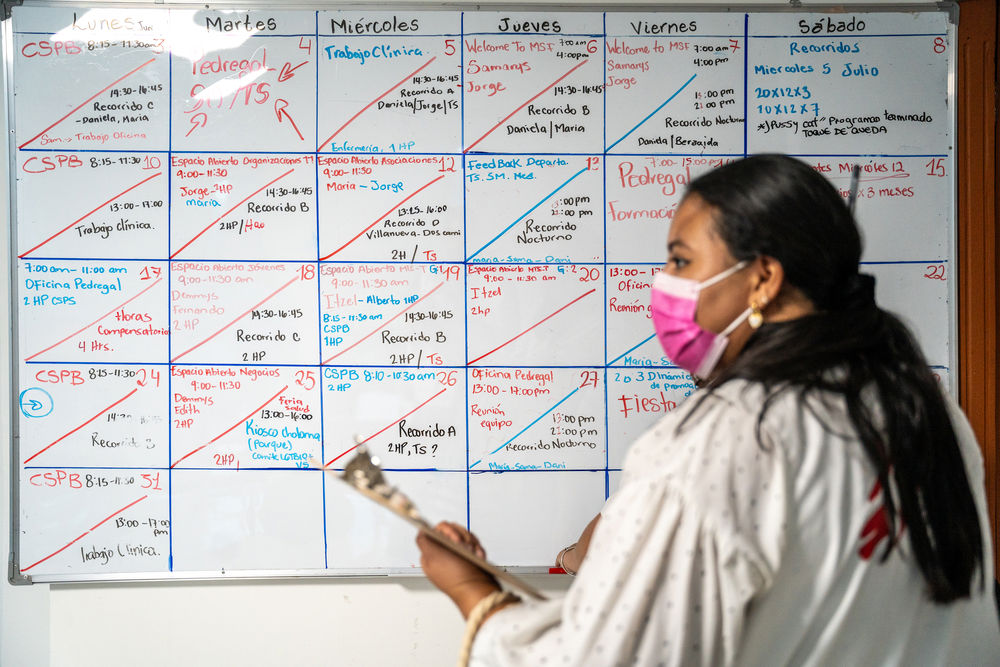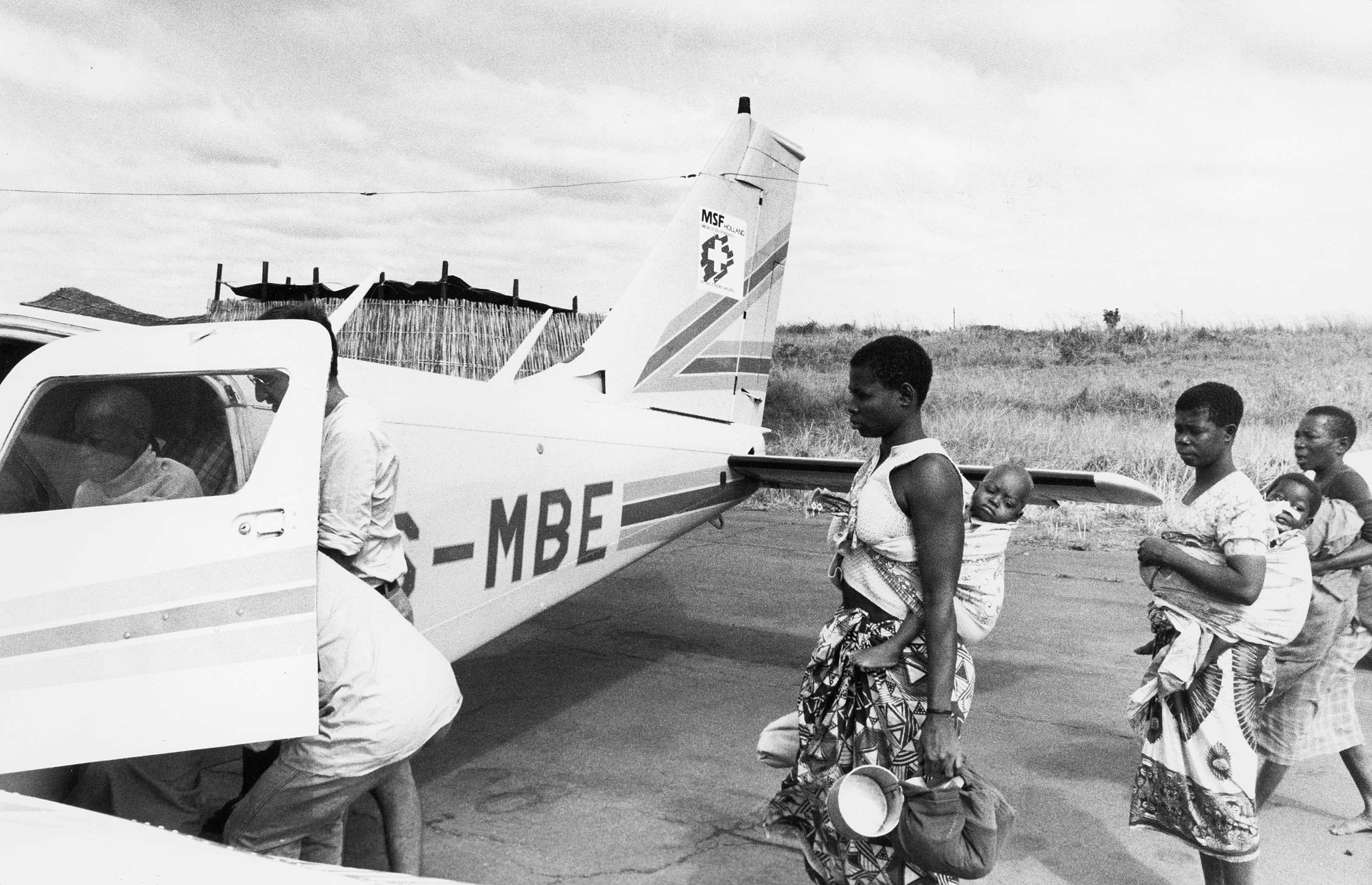“We sex workers always face risks,” says Carolina, a 37-year-old woman who has worked for the past 10 years on the streets of downtown San Pedro Sula, one of the most dangerous cities in Honduras. “There are men who try to hit us. Lots of men remove the condom without our consent – this is an emergency for us. I remember one time a man did it without telling me – in fact he blamed me, saying that I was going to infect him and spread disease.”
Sex workers and LGBTIQ+ are vulnerable to sexual violence
On the advice of friends, Carolina came to the clinic set up two years ago by Médecins Sans Frontières in the Guamilito neighborhood, close to the streets where Carolina and dozens of women and men work in the sex trade. “My friends told me to go to the MSF clinic,” she says. “I went immediately, and they treated me very well. Thank God I came out clear in everything. I finished all the treatment, and I didn’t catch HIV or any other disease.”
The treatment Carolina refers to is post-exposure prophylaxis (PEP), a combination of medications that prevent HIV infection. In addition, treatment is provided to prevent other sexually transmitted diseases and unintended pregnancies.
Providing this type of care is one of the reasons why MSF set up its clinic in San Pedro Sula. In Honduras, sex workers and the LGBTIQ+ population are especially vulnerable to sexual violence, which can have a range of medical and psychological consequences.
Post-exposure prophylaxis & Pre-exposure prophylaxis
“San Pedro Sula was one of the cities with the highest number of cases of violence and sexual violence in 2022, according to data from the Violence Observatory of the National Autonomous University of Honduras,” says MSF project coordinator Joaquim Guinart. “Although comprehensive care for victims and survivors of sexual violence is still hard to find, we hope that this will soon change.”
As well as protecting people after they have been put at risk of sexually transmitted diseases, MSF teams are working on preventing HIV in advance, using a treatment known as pre-exposure prophylaxis (PrEP).
“One of our focuses at this clinic is to work on HIV prevention with pre-exposure prophylaxis, which is taken before a risky relationship or is taken continuously in order to reduce the incidence of this virus in groups of people who do not receive adequate treatment – due to a lack of resources but also due to stigma and discrimination on the part of certain health professionals,” says Guinart.
MSF’s medical and health promotion teams work to raise awareness of the importance of the free and confidential treatment available at the clinic in San Pedro Sula. Most patients come for counselling and to receive prophylactic treatment.
To date, MSF teams at the San Pedro Sula clinic have provided more than 177 treatments of PEP to people who have experienced risky sexual relations or sexual violence. Meanwhile, 240 people have received PrEP, half of whom are continuing to receive treatment after being identified as at risk of infection.
However, MSF’s overall aim is to improve access to comprehensive healthcare for people who find themselves excluded from care or subject to stigma in state-run hospitals and clinics. “Providing assistance in HIV prevention is one of the gateways to a comprehensive vision of care for these groups of people, which includes sexual and reproductive healthcare, mental healthcare and social support,” says Laureline Lasserre, MSF humanitarian affairs officer. “We are talking about people who usually live in contexts of great socio-economic vulnerability, where they face multiple barriers when trying to access decent medical services without encountering prejudice or experiencing physical or psychological violence.”
A trans woman mistreated at the hands of various health professionals
Isabela, a young trans woman who regularly attends psychological therapy sessions with MSF, describes her mistreatment at the hands of various health professionals as she went through the gender transition process.
“I could afford to see psychologists, but I was discriminated against, both emotionally and physically,” she says. “It wasn’t just the comments and insults. My psychiatrist would forget my name and my pronouns, or she would introduce the subject of religion, or she would relate my depression to who I am, saying that my mental health situation was related to wanting to be a trans woman. Everything changed when I started receiving therapy with MSF. The truth is that I left my first session crying because I had never experienced such beautiful, respectful treatment.”
Kindness, empathy, and respect are all key to the relationship between the staff at MSF’s clinic and their patients.
"In these two years working with these groups of people, we have seen above all how things as simple as kindness and empathy can make a difference when providing medical and psychological care,” says Lasserre. “Recognizing them as persons with multiple dimensions who are not defined by their occupation, gender identity or sexual orientation gives them back their autonomy, the bare minimum as they face realities that remain unacceptable.”
Teams at MSF’s San Pedro Sula clinic provide comprehensive care to victims and survivors of sexual violence, including emergency and regular contraception, HIV prevention and treatment for sexually transmitted infections. They also offer mental healthcare, health education and social support. In the past two years, MSF teams in San Pedro Sula have provided more than 1,400 medical consultations, 1,075 mental health consultations and 1,319 social work consultations, and reached 15,557 people through community activities.



